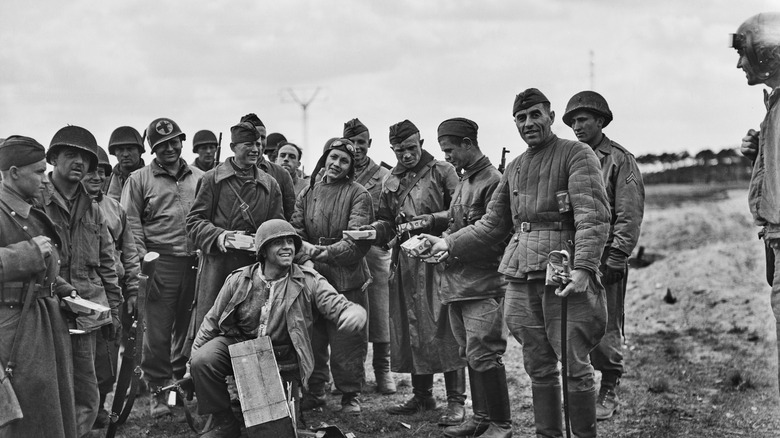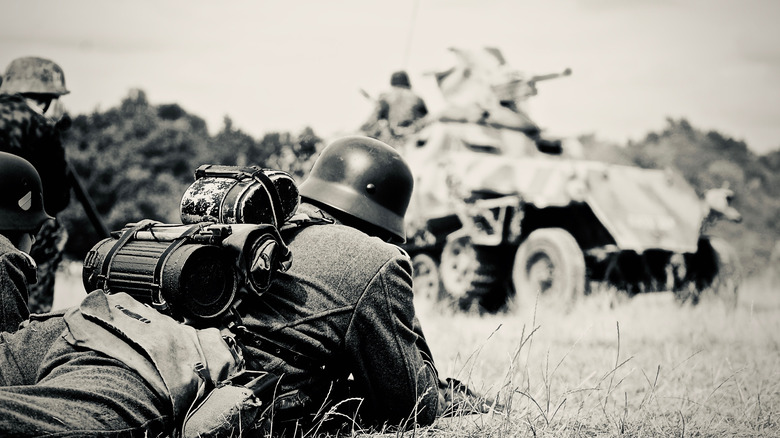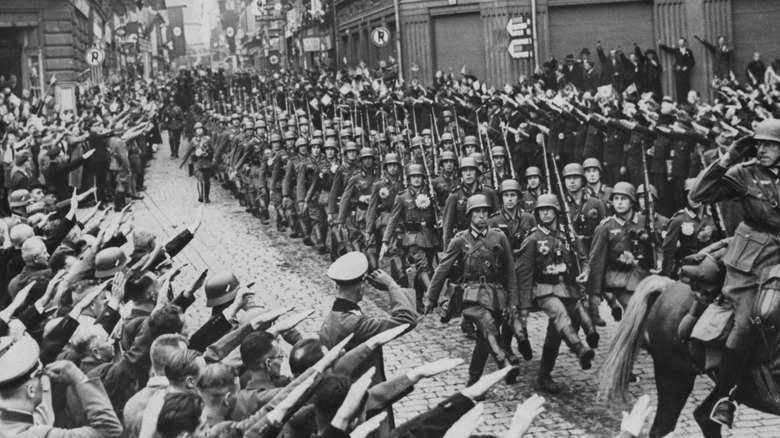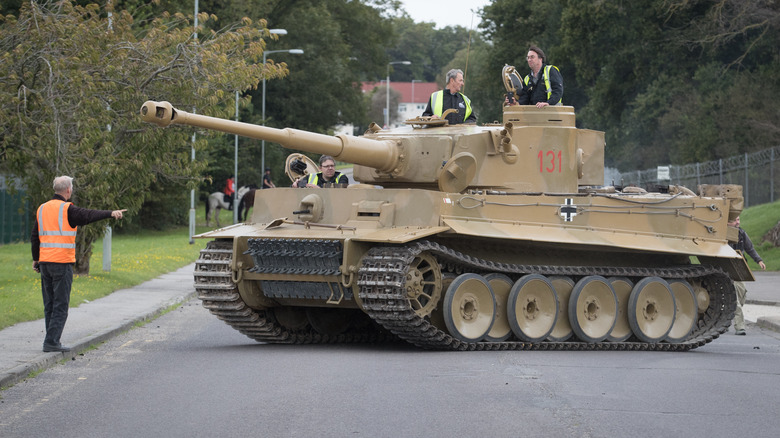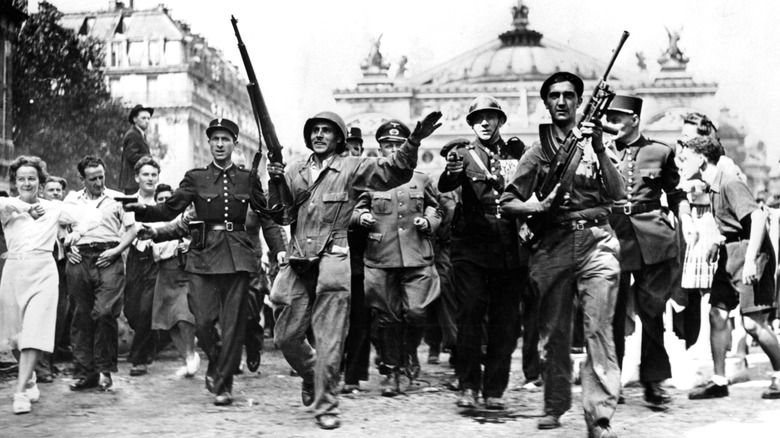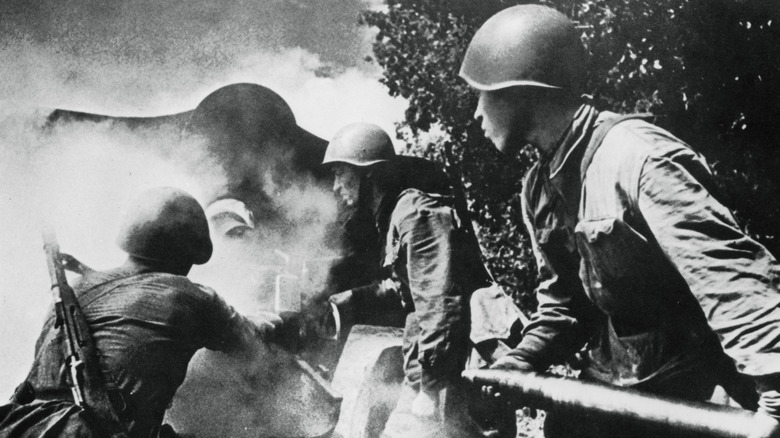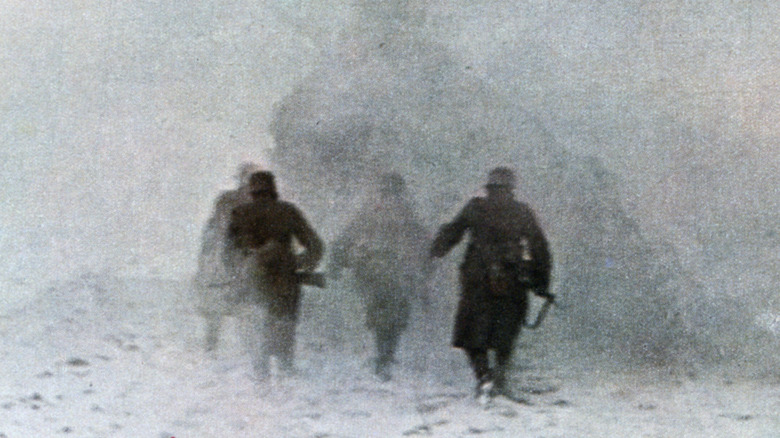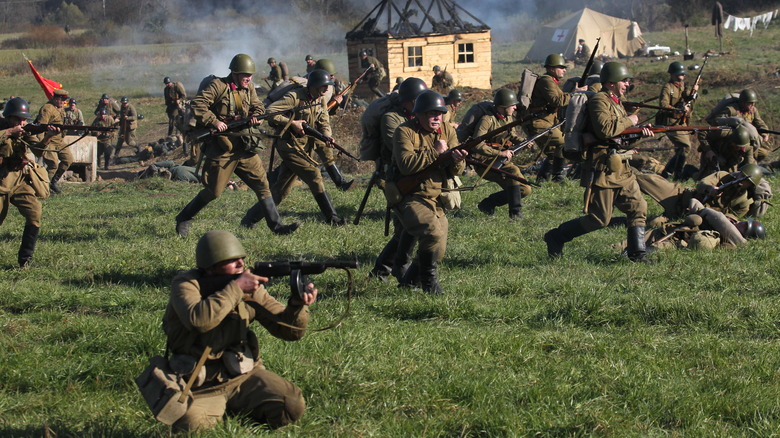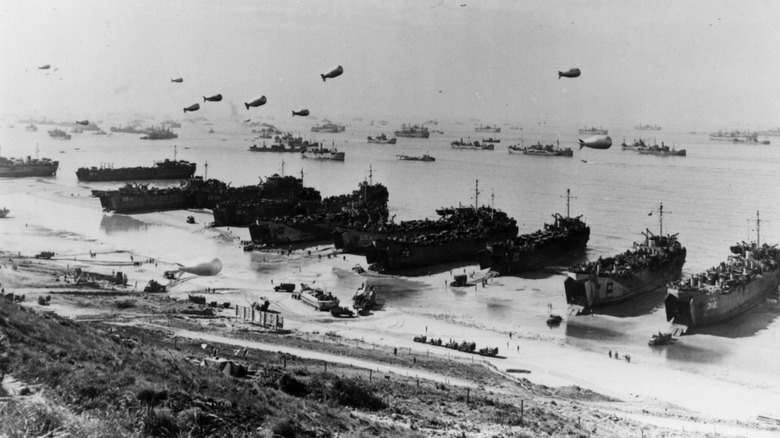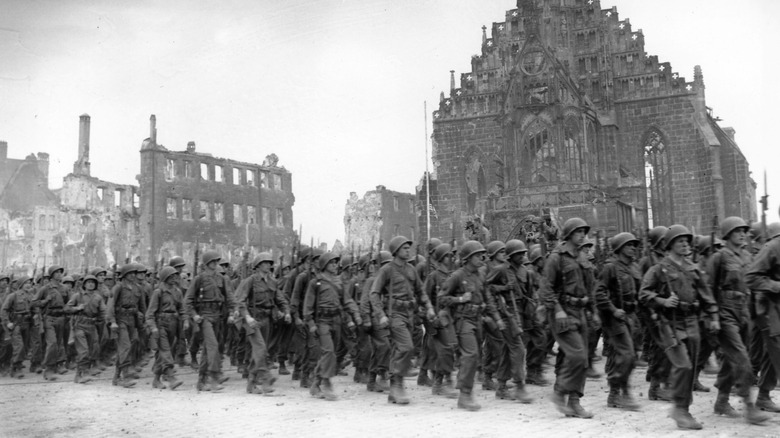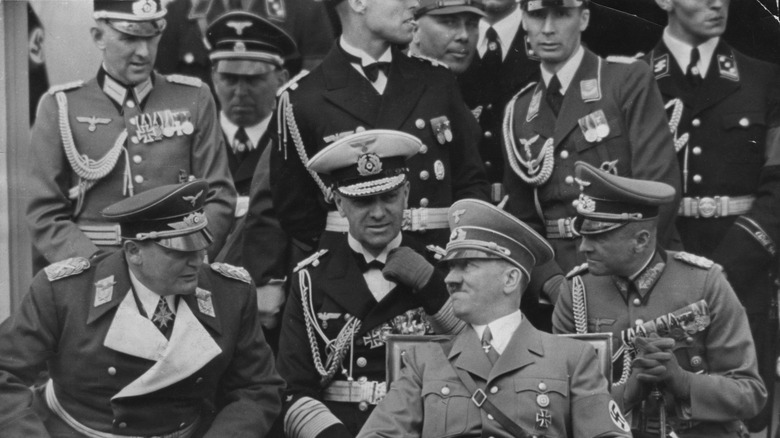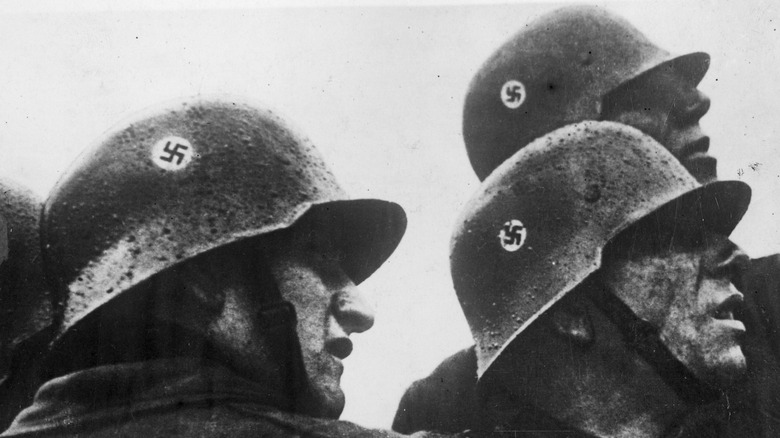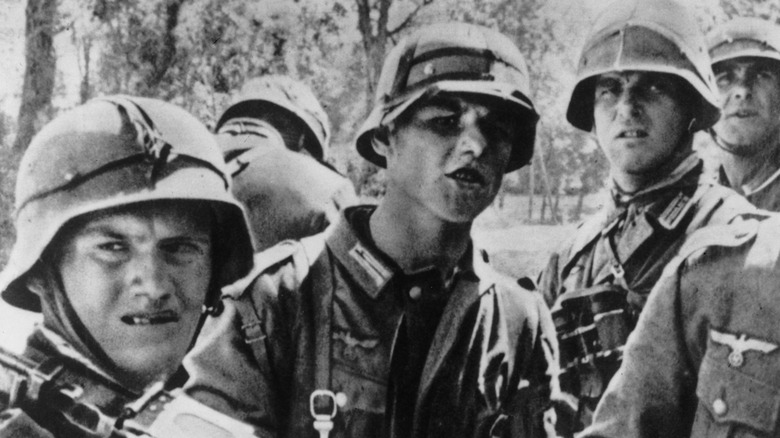Common Myths Of WWII In Europe
There are probably more armchair experts on World War II than any other major historical event. But that's hardly surprising. The largest, bloodiest, and most widespread war in human history is a fascinating subject, after all, and had an enormous role in shaping the modern world. Of course people would want to learn more and impress (annoy?) people with their knowledge.
But where there are self-described experts, there are myths and misconceptions galore. The legacy of the war in Europe alone, in which Nazi Germany and her Axis allies tried and failed to conquer the continent and exterminate all manner of what they saw as racial subhumans and ideological foes, is a patchwork story crafted by every nation that was involved, each with different agendas and perspectives. Coming up with a single, unified narrative of the deadliest war in history is no easy task, and the line between truth and fiction can get blurry. Luckily, we're here to debunk some of the more persistent myths of the conflict.
From Soviet human wave attacks to D-Day being a turning point, this is a (decidedly non-exhaustive) list of myths about WW2 in Europe.
MYTH: Blitzkrieg was an official strategy
As German armies ran roughshod over Europe, one word was plastered across global newspapers: "Blitzkrieg." Meaning "lightning war" in English, blitzkrieg was the official battlefield doctrine of the Nazi war machine and was employed with ruthless efficiency from 1939 to 1941.
Well, not really. First, the only thing directly implied by "lightning war" is "attacking fast." And it would be absurd to argue that the Nazis were the first army to come up with the idea of doing this, as if Julius Caesar and Napoleon always used to say, "Alright men, let's go get 'em! Really, really slowly! Make sure they see us coming!"
MIT goes into further detail, describing a 1998 lecture by Colonel Robert Doughty, who argues that in both Poland and especially France, the German high command was as shocked by the speed of their victory as everyone else. This implies they weren't expecting a "blitzkrieg" at all but rather drawn-out campaigns that would cost far more lives than they actually did. (Contrast this to the campaign in the USSR, where the Germans actually did expect a swift victory and got a drawn-out campaign instead.)
He goes on to argue that the mobile warfare often attributed to Nazi blitzkrieg tactics wasn't some kind of genius innovation but rather a natural development given the emerging technologies of the time. In the end, "Blitzkrieg" was a term coined to sell newspapers; Germany was just doing the best it could with what it had.
MYTH: The Germans were more mechanized than their enemies
Europe stood no chance against the Nazis for the first few years of the war. While Britain and France were still relying on old World War I equipment and tactics, Germany had spent the interwar period upgrading its armed forces with the best technology 1930s money could buy. When the war began, the Wehrmacht steamrolled its foes with an ocean of tanks and other cutting-edge weapon systems.
Nope! Turns out the popular image of tanks being the tip of a mechanized German offensive spear is an invention of Nazi propaganda. They wanted the world to look on their war machine with envy and fear, but in reality, History Net reports that of the 135 German divisions that attacked France in 1940, only 16 were mechanized. And according to Lone Sentry, the bulk of the German army relied on horses for transport throughout the war. In November 1943, only 52 of 322 German divisions were armored or motorized. A year later, only 42 of 264 total divisions got around without horses. The article concludes by blaming Germany's critical oil shortage, as well as economic woes and Allied bombardment, for this anachronistic lack of modernization. But even if it had seized the Caucasus oil fields in 1942, U.S.-scale mass production of motorized vehicles would never become a reality in a Germany that History Net reports only had one car for every 47 civilians.
It wasn't the Allies playing catch-up — it was Germany.
MYTH: German tanks were always superior
Germany didn't just have the sharpest uniforms in WW2, but the best equipment. Their tanks, especially the Tiger, were the stuff of legend, capable of blasting through American Sherman and Soviet T-34 tanks like a hot knife through butter. With their cutting-edge armor leading the charge, it's no wonder it took the whole world to bring Germany down.
There's a lot to unpack here. Hot Cars examines the Tiger's fearsome reputation and concludes that, while it did indeed have thicker armor and a deadlier gun than most Allied and Soviet tanks of the time, it was also far too expensive to produce. Oil, spare parts, and manpower shortages further reduced their numbers and effectiveness throughout the war. The article also points out that while a Tiger could make short work of an American M4 Sherman, tank-hunting was never supposed to be the Sherman's job: That's what airstrikes and artillery were for. The same site even argues that, far from being the undergunned, underarmored death traps they're often maligned as, Shermans were actually the best tanks of the war due to their low production costs, reliability, and rugged effectiveness.
Meanwhile, don't sleep on Soviet T-34 medium and KV-1 and -2 heavy tanks. War History Online describes the Battle of Raseiniai in 1941, when a single KV tank briefly held up an entire German division. Meanwhile, International Historic Films reports that the Germans were shocked by the nigh-invulnerability of the T-34 when they first encountered it.
MYTH: The French Resistance played an important role
The fight for France wasn't over when Germany overran the country in 1940. Blending in by day, sneaking messages to the Allies and ambushing German patrols from the shadows of Paris by night — were the guerrillas of the French Resistance. Their clandestine insurgency and spy network were vital to Allied success, and a constant thorn in Hitler's side.
The very presence of this entry on the list probably gave it away, but the actual French Resistance was far from the beret-wearing, badass freedom force it's been made out to be. SF Gate describes Douglas Porch's "The French Secret Services," which explains that Resistance efforts to sabotage France's Nazi occupiers were extremely rare. Throughout the war, only a microscopic percentage of French people were even willing to read leaflets, much less dynamite a Nazi outpost while clutching a cigar in their teeth. And many of those who helped smuggle downed Allied pilots out of the country often did so for the money, not conviction. Heroic resisters did exist, but it wasn't exactly a whole nation in organized, underground rebellion the way Free French leader and future president Charles de Gaulle later tried to frame it.
Want to read up on an actually effective resistance movement? Check out this History Learning Site article on Josef Tito's Yugoslavian Partisans, who essentially liberated their own country from the Nazis during the war.
MYTH: The Soviets relied on human wave tactics
The Soviets sustained such high casualties in WW2 because they relied on human wave attacks: throwing disorganized masses of unarmed peasants into the teeth of German machine guns until there was no ammo left to resist them. With limitless manpower, who needs more sophisticated tactics?
Yeah, there's a lot wrong with this oft-repeated narrative, which consists of multiple smaller myths. In addition to soundly debunking the idea the Russians had limitless manpower (they actually had shortages of men in 1943) or ever sent their troops to fight without weapons, The Collector reports that what the Germans mistook for "human wave attacks" were actually poorly coordinated frontal assaults carried out by a desperate army that lacked the training and technology to compete with the Wehrmacht during Operation Barbarossa, the initial Axis invasion of the USSR. But that was a low point, and the Red Army learned and improved moving forward.
An episode of "Soviet Storm: WW2 in the East" provides several examples of Soviet tactical evolution throughout the war. At Kursk, for example, the Red Army stopped placing its anti-tank artillery evenly along the line and started grouping them together in well-defended hardpoints. They also replaced the 500-lb. bombs their planes usually carried, with packs of bullet-shaped bomblets, which were much more effective at tank-hunting. These are only a few examples, but it's enough to disprove the notion that the Soviets were nothing but savage, idiot brutes who relied solely on overwhelming numbers.
MYTH: General Winter saved the USSR
Germany was nearly unstoppable leading up to its invasion of Russia, but then Hitler forgot about a little thing called the "Russian winter." Just as German tanks were rolling up to Moscow, the temperatures plummeted and the now-freezing Wehrmacht retreated. Without "General Winter," as it was sometimes called, the Nazis would've won.
This common narrative is oversimplified to the point of cartoonish absurdity. No, the Nazis did not forget about the Russian winter. They invaded in summer 1941 and merely thought that Operation Barbarossa would be over before the first snows fell. Given their incredible track record in Poland and France, and Russia's embarrassing one in Finland (via Britannica), you can at least see why people thought that Germany, as Hitler infamously said (per the National WW2 Museum), could merely "kick in the door" and watch as "the whole rotten structure [came] tumbling down."
That's not what happened, of course, but a harsh winter isn't the reason why. If anything, CounterPunch reports that the cold actually helped the Germans by freezing the ground solid, allowing Panzers to get back on the road after spending months trapped in the autumn mud. (According to The Economist, "Rasputitsa," or "time without roads," occurred twice a year when the spring thaw and autumn rains turned Russia's primitive dirt road network into an ocean of mud.) Rather, it was fanatical Soviet resistance and sacrifice, as well as German supply lines being stretched beyond the breaking point, that saved Moscow.
MYTH: The Soviets slaughtered their own men
According to the World Population Review, 27 million Soviets died in WW2, more than any other country. But the Soviets inflicted some of those casualties on themselves. If you've seen "Enemy at the Gates," you might remember a scene where Soviet officers gun down their own troops for retreating at Stalingrad. These "blocking" detachments — units with orders to fire on their own men to prevent unauthorized withdrawal — reinforced the idea that in the Red Army, it took more courage to retreat than advance. Scary, brutal stuff.
Well, not really. An episode of "Soviet Storm: WW2 in the East" says that while these units were indeed created to enforce Stalin's Order No. 227 (issued in July 1942), which forbade retreat, they were far more toothless than popular imagination suggests. First, any army using blocking units to prevent the collapse of the front line was certainly too desperate to waste good men and weapons outfitting them. Therefore, actual blocking detachments were small and underequipped, usually contained the worst soldiers in the unit, and were really only useful for rounding up stragglers. According to The Collector, of the 900,000 Soviets found guilty of cowardice throughout the war (a miniscule fraction of the total Red Army), 422,000 were sent to penal (punishment) battalions, and 436,000 were jailed. Few were deliberately killed by their own officers, much less without trial. In 1944, when there was no longer a retreat to prevent, blocking units were quietly discontinued.
MYTH: D-Day was the turning point
Hitler was winning the war on June 5, 1944. But the tide turned when Anglo-American forces courageously invaded Normandy, on the northern coast of Nazi-occupied France, the following day, leading to Germany's surrender less than a year later.
Well, kind of. D-Day was definitely a huge deal. Britannica says that Operation Overlord opened up a long-awaited second front and played a substantial role in Germany's downfall.
But Germany was already losing the war badly when D-Day started. It's tough to identify a single turning point in a war this big, but November 1942 might be the closest we'll get. That month, Germany suffered back-to-back-to-back reversals at the hands of the British at El Alamein (per BBC), the Americans in Operation Torch (Britannica), and, crucially, the Soviets when they got surrounded at Stalingrad (History), one of the largest and deadliest battles in history. Germany never recovered and spent the time between that point and D-Day retreating everywhere. Plus, Britannica reports that the Battle of the Atlantic had already turned in the Allies' favor by 1944, and Encyclopedia notes that the air war had already devastated the once-mighty Luftwaffe. Germany still controlled much of its conquered territories in June 1944, but the decisive battles that in hindsight determined the war's outcome had already been fought.
Rather than turning the tide of war in favor of the Allies, it would be more accurate to say that D-Day accelerated an already inevitable Allied victory.
MYTH: The Western Allies weren't vital to winning the war
Look up any other "WW2 myths" list online and you'll almost certainly find an entry challenging the narrative that brave, selfless America and plucky sidekick England saved the world alone. You'll probably read on to learn that the Soviets did the bulk of the fighting and dying, and that they inflicted nearly 80% of German casualties. This is all true (per Gor History), but it's not the full story. At this point, the myth that anyone thinks the U.S. won the war singlehandedly might be more common than the myth they actually did. Furthermore, the idea that Russia did all the work while the Western Allies dawdled on the sidelines or jumped in at the last second to seize the glory, isn't any more accurate than the myth it's overcorrecting.
Between the Allied blockade (History on the Net), the vital provisions supplied by American Lend-Lease, the British-American bombing campaign than wreaked havoc on German industry and cities while also tying down the Luftwaffe (therefore preventing it from supporting the Wehrmacht at the front) and ultimately destroying it (IWM), the West took a massive bite out of Hitler's plans. Furthermore, they still inflicted huge casualties on, and liberated lots of territory from, the Axis powers, and captured millions of soldiers in the process (just as effective as killing them).
It's not at all diminishing the incredible sacrifice and contributions of the USSR to acknowledge the importance of the Western Allies.
MYTH: If Hitler had listened to his generals, he would've won
Between delaying the attack on Moscow (via New World Encyclopedia), forbidding retreat at Stalingrad (History), and ordering ludicrous counterattacks at Falaise (Britannica), the Ardennes (History), and Lake Balaton (Warfare History Network), Hitler was his own worst enemy. If he'd just listened to his wise generals, who opposed these decisions, he might've won.
It's true Hitler was no genius and made many mistakes, like forbidding retreat. But New World Encyclopedia says it was a no-retreat order that saved the Germans from collapse at Moscow. And at Rzhev (War History Online), Kursk (Jewish Virtual Library), and southern France (History Net), he did allow retreats. So it's important not to cherry pick.
Potential History debunks the idea that capturing Moscow would've ended the war in the USSR, like Hitler's generals (and many internet armchair experts) believed, or that Hitler was wrong to prioritize capturing oil fields and resource-rich land over cities. Although they blamed him in their memoirs, Hitler's generals still mostly agreed with his decisions and were frequently wrong when they didn't. "Many times he did [listen to his generals]," Potential History says, "and his generals were wrong. And many times he didn't, and he turned out to be right."
Ultimately, Germany didn't lose because they made blunders, and therefore couldn't have won by merely avoiding them. The video says they lost because they were outnumbered, outspent, outgunned, and out of fuel. Some way, somehow, the Nazis were going down.
MYTH: Germany almost won the war with an atomic bomb
Both assumptions implied here are false. The first is that Germany almost got an atomic bomb. But Vanderbilt explains that between Nazi rejection of "Jewish" science (nuclear physics), Allied sabotage, disappointing progress, and resources being needed elsewhere, the program was mothballed long before the science (much less the logistics) of developing such a weapon had been worked out. Plus, even America couldn't develop the Bomb while the war in Europe was still happening; it's unlikely economically inferior Germany could've beaten them to the punch.
The second false assumption is that Germany would've won the war with a nuke if it had one. Even if we ignore everything that made it impossible for Germany to get the bomb, History wonders if the Luftwaffe could even deliver it to a target; Germany lacked the large bombers necessary to carry it, and would've lost control of the skies by the time they could get it, in even the most ludicrous alternate history scenarios.
For Germany to be able to nuke its foes into oblivion, it would need a larger economy to develop multiple nukes and control of the seas and skies to deliver them. And if they had those advantages, they'd already be winning the war without a nuke in the first place and therefore wouldn't need it. (Also, Hitler getting a nuke in 1940-41 when he was actually winning isn't any more realistic. You might as well give him a Death Star.)
MYTH: The Wehrmacht didn't commit war crimes
Everyone knows Nazi Germany was evil, but true students of history know that the worst were the SS. Short for Schutzstaffel, or "protective echelon," the SS (and its paramilitary arm, the Waffen SS) were controlled not by the German state but by the Nazi Party, according to History. Since it included only the most fanatical Nazis, it spent far more time slaughtering innocents than the Wehrmacht (German military) did. For the most part, regular soldiers were just focused on fighting the war, and often shook their heads in moral exasperation at the murderous antics of their SS comrades.
Yeah, not so fast. First, the distinction implied by "controlled by the Nazi party" isn't particularly meaningful in a totalitarian regime where everyone answered to Hitler. Second, according to Harvard, this so-called myth of the Wehrmacht's "clean hands" was cooked up by former German generals after the war, mainly to absolve themselves of responsibility for the Reich's numerous atrocities.
The Three Arrows does an excellent job pointing out that not only did the German military gleefully commit atrocities, but it was in fact a thoroughly and deliberately antisemitic organization before Hitler even came to power. Furthermore, to the Nazis, war and genocide were not distinct objectives but rather two inseparable halves of a strategic whole. The Wehrmacht was therefore not the noble, gentlemanly force its veterans later tried to portray it as. German soldiers, SS or not, were fighting for genocide. And they knew it.
